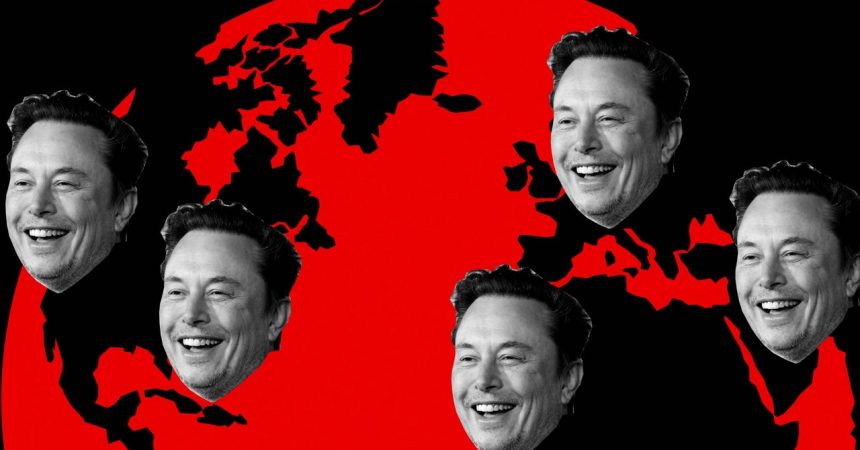Elon Musk, the South African-born entrepreneur, has become a ubiquitous force in modern industry, his influence extending across a diverse range of sectors from subterranean transportation to extraterrestrial exploration. His ventures, often characterized by ambitious goals and disruptive technologies, have reshaped conventional thinking and sparked both fervent admiration and heated debate. From the intricate network of tunnels being carved by The Boring Company to the sprawling Gigafactories producing Tesla’s electric vehicles and the bustling launchpads sending SpaceX rockets skyward, Musk’s fingerprints are seemingly everywhere, marking a new era of technological advancement driven by a singular, and sometimes controversial, vision.
Musk’s foray into tunneling, with The Boring Company, represents a radical approach to urban transportation, aiming to alleviate traffic congestion by creating underground networks for vehicles and high-speed transit systems. This ambition, born out of Musk’s frustration with Los Angeles traffic, envisions a future where vehicles are transported on electric platforms through a network of tunnels, bypassing surface-level gridlock. While the concept has faced skepticism and regulatory hurdles, The Boring Company has already secured projects and completed test tunnels, demonstrating Musk’s commitment to transforming urban mobility. The company’s vision extends beyond mere point-to-point transportation, encompassing ambitious concepts like the “Hyperloop,” a high-speed vacuum tube system designed to revolutionize long-distance travel.
Tesla, Musk’s electric vehicle company, has arguably had the most profound impact on the automotive industry, challenging the dominance of traditional combustion engine vehicles and ushering in an era of sustainable transportation. From the sleek Roadster to the mass-market Model 3 and the futuristic Cybertruck, Tesla has not only popularized electric vehicles but also pushed the boundaries of automotive technology with features like Autopilot, a sophisticated driver-assistance system. Tesla’s Gigafactories, massive production facilities strategically located around the globe, are integral to the company’s ambitious production goals, enabling the mass production of electric vehicles and batteries. These factories embody Musk’s focus on vertical integration and automation, playing a key role in driving down the cost of electric vehicles and making them accessible to a wider market.
Beyond terrestrial transportation, Musk’s ambitions extend to the cosmos through SpaceX, his aerospace manufacturer and space transportation services company. Driven by a desire to make humanity a multi-planetary species, SpaceX has achieved remarkable feats, including developing reusable rockets, significantly reducing the cost of space travel, and securing contracts with NASA for cargo and crew transport to the International Space Station. The company’s Falcon 9 rocket has become a workhorse of the space industry, launching satellites, deploying cargo, and ferrying astronauts into orbit. SpaceX is also developing Starship, a fully reusable spacecraft designed for missions to the Moon, Mars, and beyond, representing Musk’s ultimate goal of establishing a self-sustaining human presence on other planets.
However, Musk’s relentless pursuit of innovation and disruption has not been without controversy. His management style, characterized by demanding expectations and a fast-paced work environment, has drawn criticism. His pronouncements on social media, often impulsive and provocative, have generated both amusement and concern, occasionally impacting Tesla’s stock price and raising questions about his leadership style. Furthermore, some of his ventures, particularly The Boring Company’s ambitious tunnel projects, have faced setbacks and delays, raising doubts about their feasibility and long-term viability.
Despite these controversies, Musk’s impact on various industries is undeniable. He has challenged conventional wisdom, spurred innovation, and injected a sense of urgency into fields often resistant to change. Whether it’s revolutionizing transportation with electric vehicles and underground tunnels, or pushing the boundaries of space exploration with reusable rockets and interplanetary spacecraft, Musk’s ventures reflect a grand vision for the future, one driven by a relentless pursuit of technological advancement and a desire to address some of humanity’s most pressing challenges. While his methods and pronouncements may sometimes draw criticism, his impact on the 21st-century technological landscape is undeniable, leaving a lasting legacy of disruption and innovation across a wide spectrum of industries.



